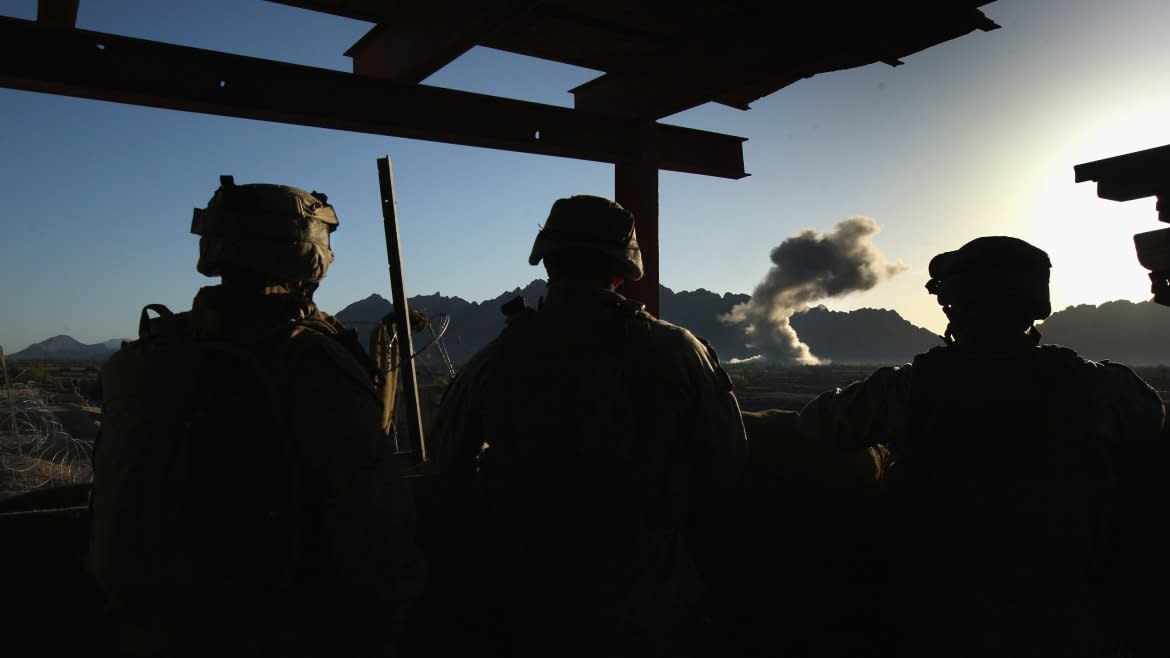U.S. Military: We’ll Still Bomb Post-Pullout Afghanistan

The defense intellectual Fred Ikle once wrote that every war must end. Yet the U.S. military’s plans for Afghanistan after President Joe Biden’s announced withdrawal are its latest rebuke to Ikle.
In testimony to a skeptical Senate Armed Services Committee on Thursday morning, Gen. Kenneth “Frank” McKenzie of U.S. Central Command (CENTCOM) explained that after the withdrawal of American troops, the U.S. will reserve the right to launch airstrikes, typically from drones, into Afghanistan, should it perceive a threat to its interests.
“We have a number of ways to get to a ‘fix’ solution,” said McKenzie, using jargon referring to a lethal targeting designation, “ranging from precision strike at very long range, to on-the-ground options, should those prove necessary.” At a different point in the hearing, McKenzie and Sen. Richard Blumenthal (D-CT) discussed how long it takes to get armed MQ-1 Predator and MQ-4 Reaper drones into the country from offshore bases.
“I can, in fact, give the persistent overhead coverage that’s required. It’ll simply require far more platforms, operating at greater range,” McKenzie said, suggesting that the skies above Afghanistan will continue to see U.S. surveillance and strike aircraft. It was a unilateral declaration at a time when Afghanistan’s politics are entirely unsettled and many, including McKenzie, question the post-withdrawal viability of the Afghan military.
The Promise and the Tragedy of Biden’s Afghanistan Speech
Within the context of a Senate hearing, McKenzie’s comments are meant to reassure nervous legislators that the U.S. can prevent a future 9/11 emanating from Afghanistan. But they do so by blurring the line between a war ending and a war persisting at a greater altitude.
It’s a familiar refrain from the 2003-2011 incarnation of the Iraq war, when the military attached similar caveats to a pullout that Barack Obama portrayed as a definite end to the war. Ikle should have anticipated that when hegemonic powers are compelled to withdraw from hostilities they can’t control, they don’t seek peace so much as what might be called peace with benefits.
Testifying beside McKenzie was his counterpart at U.S. Africa Command, Gen. Stephen Townsend, who provided a glimpse into how it will operate. One of the Trump administration’s final acts was to move forces out of Somalia. But rather than ending the conflict, “we have been commuting to work,” Townsend explained, from nearby bases like the massive Camp Lemonnier in Djibouti.
“We fly in to conduct training and to advise and assist our partners,” Townsend said. “We’ve done four such operations in the last roughly 90 days, one of which is ongoing right now.”
Sen. Jack Reed (D-RI), an indispensable Biden ally who chairs the Senate committee, helped blur the distinction between withdrawing from Afghanistan and continuing with the war from a greater distance. Biden’s withdrawal “should be seen as a transition, not closure, and should not mean an end to our counterterrorism efforts,” he said.
McKenzie put the bigger picture far more bluntly. “The long-term view from the War on Terror is this: It’s not going to be bloodless,” he said. “The War on Terror is probably not going to end.”
Fred Ikle, who died in 2011, was unavailable for comment.
Get our top stories in your inbox every day. Sign up now!
Daily Beast Membership: Beast Inside goes deeper on the stories that matter to you. Learn more.

 Yahoo Movies
Yahoo Movies 
